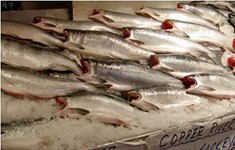 laska Seafood Marketing Institute (ASMI) officials are very concerned after Walmart sent an email to salmon suppliers reiterating its policy on purchasing only wild salmon that is MSC-certified or that is from a fishery in Fishery Improvement Project (FIP).
laska Seafood Marketing Institute (ASMI) officials are very concerned after Walmart sent an email to salmon suppliers reiterating its policy on purchasing only wild salmon that is MSC-certified or that is from a fishery in Fishery Improvement Project (FIP).Walmart called the letter a routine communication with suppliers at the start of the salmon season, but the letter still prompted a strong response from ASMI.
“This has some pretty serious implications for the fishing communities in Alaska which — according to most — have some of the best managed fisheries in the world,” ASMI executive director Michael Cerne said.
In a letter that Walmart sent to its salmon suppliers this week, the retailer said, “To meet our requirements for wild-caught seafood, the source fishery must be certified sustainable to the MSC standard (or equivalent) or, if not certified, actively working toward certification. As of today, Walmart has not yet determined any other standard to be equivalent to MSC. Therefore, no other standards will be accepted as equivalent until such time as we announce our decision.”
In an email to suppliers, Catherine Johnson, senior buyer for Walmart, said that the policy applies to all wild caught salmon sources for Walmart USA in department 83, which includes frozen commodity salmon, smoked salmon, value-added salmon, and salmon that is used as an ingredient in another product.
Sources of MSC-certified salmon are available from Alaska, British Columbia, and Russia, the Walmart letter stated. “If you are not already sourcing from an MSC-certified fishery, please explore these options,” the letter said.
“I find it amazing that America’s largest retailer will not buy American seafood unless it is certified by a London-based certification group, while promoting foreign seafood with poorly managed fisheries and quality [as they are in] Russia,” Tyson Fick, ASMI communications director, told SeafoodSource.
However, Walmart’s decision will likely encourage other global retailers to follow suit, according to Greg Knox, executive director of SkeenaWild Conservation Trust. “It is a good move by Walmart and really shows their sense of corporate responsibility and sustainability. It creates more leverage for other companies to come out with similar positions,” Knox told SeafoodSource.
“I can’t speak for each major salmon processor individually, but I get the sense that they are not interested in returning to the MSC program under any circumstance which would mean Walmart may have to look elsewhere for salmon. That said, it does seem there is some wiggle room for Walmart to make an announcement at a later date,” Fick said.
Eventually, the major Alaska wild salmon processors that opted to not renew MSC certification may change their stance, Knox said. “It depends on what sort of pressure they see from fishermen. There is a good chance the fisheries that are MSC-certified will be in higher demand because companies like Walmart demand it. And those fisheries [that are MSC-certified] will likely command a higher premium,” said Knox.
Meanwhile, Walmart encouraged its wild Alaska salmon suppliers to source from fisheries in public FIPs. Currently, there is only one public FIP in the world — a small project led by the World Wildlife Fund for chum salmon in the Tugur River of Russia, according to Walmart. “However, we are aware that there are discussions of other FIPS in Russia and Alaska. To meet Walmart’s requirements, these FIPs must be made public and must have a comprehensive work plan available showing how it is working toward certification,” the letter stated.
Walmart works with the Sustainable Fisheries Partnership (SFP), which asked ASMI to be part of a FIP.
“We feel that we have an existing fisheries improvement project with our current process, including the Alaska Department of Fish and Game’s multimillion dollar research plan that addresses concerns that SFP raises,” Cerne said.






